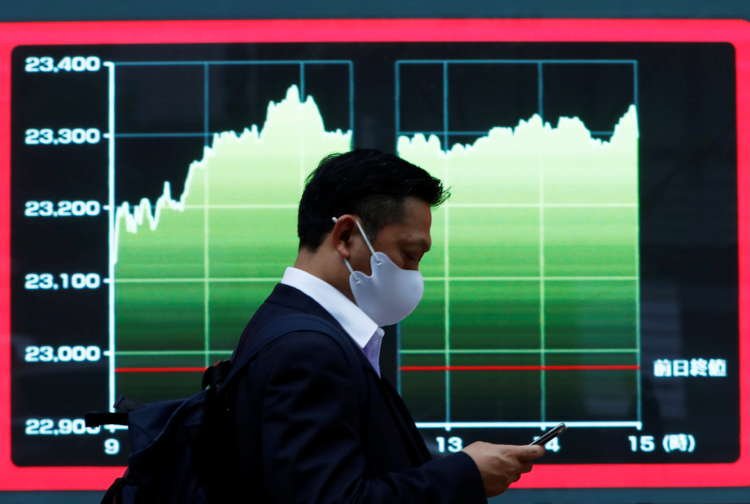Shares turn cautious as bond yields, commodities surge
Published by linker 5
Posted on February 22, 2021
4 min readLast updated: January 21, 2026

Published by linker 5
Posted on February 22, 2021
4 min readLast updated: January 21, 2026

By Wayne Cole
SYDNEY (Reuters) – Asian shares turned mixed on Monday as expectations for faster economic growth and inflation globally battered bonds and boosted commodities, while rising real yields made equity valuations look more stretched in comparison.
MSCI’s broadest index of Asia-Pacific shares outside Japan went flat, after slipping from a record top last week as the jump in U.S. bond yields unsettled investors.
Japan’s Nikkei recouped 0.8% and South Korea 0.1%, but Chinese blue chips lost 1.4%.
S&P 500 futures dipped 0.1% and EUROSTOXX 50 futures 0.3%, while FTSE futures fell 0.7%.
Bonds have been bruised by the prospect of a stronger economic recovery and yet greater borrowing as President Joe Biden’s $1.9 trillion stimulus package progresses.
“Yield curves have continued to steepen, as COVID infection rates decline further, reopening plans are discussed and a large U.S. fiscal stimulus package looks likely,” said Christian Keller, Barclays’ head of economics research.
“This in principle signals a better medium-term growth outlook for the U.S. and beyond, as other core yields curves are moving in the same direction,” he added. “Meanwhile, central banks seem set to look through this year’s inflation increase, keeping the curves’ front end anchored.”
Federal Reserve Chair Jerome Powell delivers his semi-annual testimony before Congress this week and is likely to reiterate a commitment to keeping policy super easy for as long as needed to drive inflation higher.
European Central Bank President Christine Lagarde is also expected to sound dovish in a speech later Monday.
Yields on 10-year Treasury notes have already reached 1.38%, breaking the psychological 1.30% level and bringing the rise for the year so far to a steep 43 basis points.
Analysts at BofA noted 30-year bonds had returned -9.4% in the year to date, the worst start since 2013.
“Real assets are outperforming financial assets big in ’21 as cyclical, political, secular trends say higher inflation,” the analysts said in a note. “Surging commodities, energy laggards in vogue, materials in secular breakouts.”
A COPPER-PLATED RECOVERY
One of the stars has been copper, a key component of renewable technology, which shot up 7.7% last week to a nine-year peak. Even the broader LMEX base metal index climbed 5.5% on the week.
Oil prices have gone along for the ride, aided by tightening supplies and freezing weather, giving Brent gains of 22% for the year so far. [O/R]
On Monday, Brent crude futures were up another 66 cents at $63.57 a barrel, while U.S. crude added 51 cents to $59.75.
All of which has been a boon for commodity-linked currencies, with the Canadian, Australian and New Zealand dollars all sharply higher for the year so far.
Sterling reached a three-year top at $1.4050, aided by one of the fastest vaccine rollouts in the world. British Prime Minister Boris Johnson is due to outline a path from COVID-19 lockdowns on Monday.
The U.S. dollar index has been relatively range-bound, with downward pressure from the country’s expanding twin deficits balanced by higher bond yields. The index was last at 90.342, not far from where it started the year at 90.260.
Rising Treasury yields has helped the dollar gain somewhat on the yen to 105.60, given the Bank of Japan is actively restraining yields at home.
The euro was steady at $1.2120, corralled between support at $1.2021 and resistance around $1.2169.
One commodity not doing so well is gold, partly due to rising bond yields and partly as investors question if crypto currencies might be a better hedge against inflation. [GOL/]
The precious metal stood at $1,783 an ounce, having started the year at $1,896. Bitcoin was off 2.2% on Monday at $56,209, but started the year at $19,700.
(Editing by Shri Navaratnam and Jacqueline Wong)
Explore more articles in the Trading category











